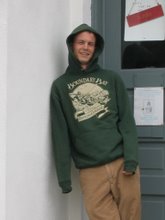So I'm rereading Leithart's Again Christianity and I came on somthing that I thought that I would share since it in some ways speaks to the ideas of identification and seperation, as Newbiging had.
"When an apostle showed up in a synagogue in the diaspora, he preached the gospel into a culture, the Jewish culture, that already had its own myths (he uses this in Lewis' sense of myth, that is, it is an extraordinary story) and rites and rules of behavior. When an apostle showed up in a city in the Greek east, he entered a culture that had its own set of civic myths, inculcated from childhood, recited on public occaisions, celebrated in the festivals and rituals of civic religion. When an apostle ended up in Rome, he entered a citty shaped by myths of Aeneas and Augustus, memorialized in festivals and sacrifices to the genius of the emperor.
"And when the apostle came, he came with an alternative myth (which is callled the 'gospel'), taught his converts to perform rituals of initiation and conviviality (which Christians eventually called 'sacraments'), and called men to an alternative way of life (which he called 'becoming a disciple of Jesus').
"The wandering apostle may have no money in his kit; but ge came to a town with an alternative culture in his back pocket."
Identification, in that he showed the common themes of man and his longing to be part of a biger story (myth) in which he plays a part. Seperation, in that the story of Jesus is diferent than the story of civic Greek or Aeneas or Ceasar.
In that Christians are called to be on mission, we are called to show how the alternative culture centered around the person and work of Jesus is plausible and holds weight against ceasar or materialism or individualism or...

Wednesday, October 24, 2007
Subscribe to:
Post Comments (Atom)



No comments:
Post a Comment